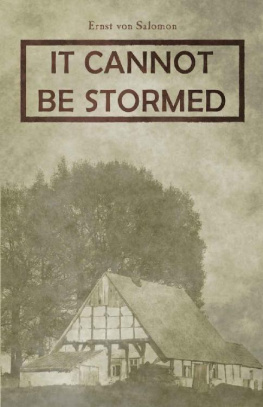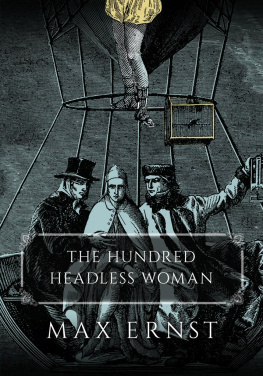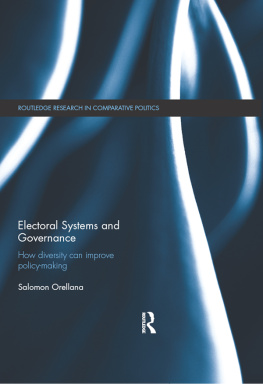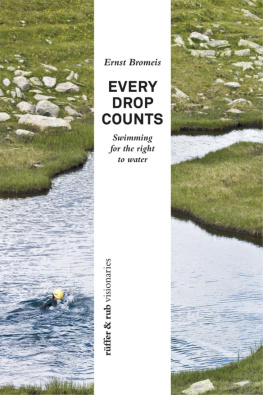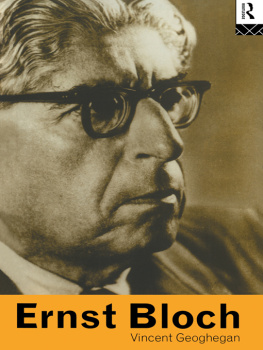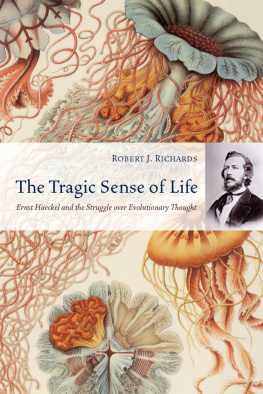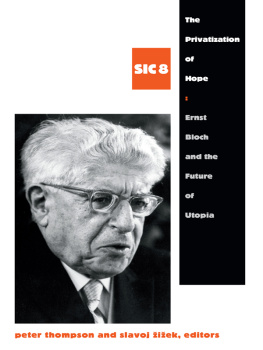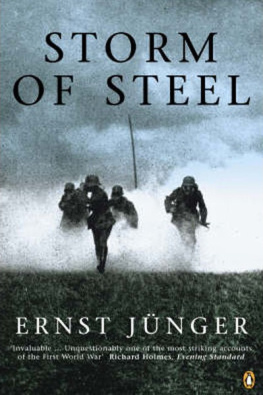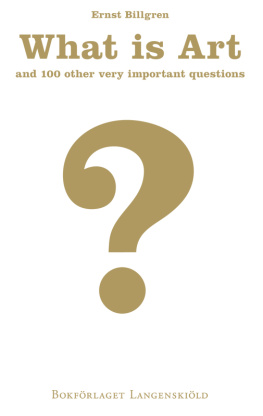Ernst von Salomon - It Cannot be Stormed
Here you can read online Ernst von Salomon - It Cannot be Stormed full text of the book (entire story) in english for free. Download pdf and epub, get meaning, cover and reviews about this ebook. year: 0, genre: Art. Description of the work, (preface) as well as reviews are available. Best literature library LitArk.com created for fans of good reading and offers a wide selection of genres:
Romance novel
Science fiction
Adventure
Detective
Science
History
Home and family
Prose
Art
Politics
Computer
Non-fiction
Religion
Business
Children
Humor
Choose a favorite category and find really read worthwhile books. Enjoy immersion in the world of imagination, feel the emotions of the characters or learn something new for yourself, make an fascinating discovery.
- Book:It Cannot be Stormed
- Author:
- Genre:
- Year:0
- Rating:5 / 5
- Favourites:Add to favourites
- Your mark:
- 100
- 1
- 2
- 3
- 4
- 5
It Cannot be Stormed: summary, description and annotation
We offer to read an annotation, description, summary or preface (depends on what the author of the book "It Cannot be Stormed" wrote himself). If you haven't found the necessary information about the book — write in the comments, we will try to find it.
It Cannot be Stormed — read online for free the complete book (whole text) full work
Below is the text of the book, divided by pages. System saving the place of the last page read, allows you to conveniently read the book "It Cannot be Stormed" online for free, without having to search again every time where you left off. Put a bookmark, and you can go to the page where you finished reading at any time.
Font size:
Interval:
Bookmark:
It Cannot be Stormed
Translated from the German by M. S. Stephens
First English edition published 1935 by Jonathan Cape Ltd.
Second English Edition published in 2011 by Arktos Media Ltd.
2011 Arktos Media Ltd.
No part of this book may be reproduced or utilised in any form or by any means (whether electronic or mechanical), including photocopying, recording or by any information storage
and retrieval system, without permission in writing
from the publisher.
Printed in the United Kingdom
isbn 978-1-907166-12-9
BIC classification: Historical fiction (FV),
Classic fiction (FC) & Germany (1DFG)
Editor: Martin Hggkvist
Cover Design: Andreas Nilsson
Layout: Daniel Friberg
Proofreader: Michael J. Brooks
Back cover photos: left and centre, scenes of street-fighting in Weimar-era Germany; on the right, Ernst von Salomon.
ARKTOS MEDIA LTD.
www.arktos.com
It Cannot
be Stormed
by
Ernst von Salomon
ARKTOS
Editors Foreword
E rnst von Salomon (1902-1972) was one of the most enigmatic individuals who have come to be classified as a part of the Conservative Revolution, a school of thought which flourished in the days of the German Weimar Republic up until the National Socialist Party (N.S.D.A.P.) came to power in 1933. He is today often, when at all, remembered for his 1951 book Der Fragebogen . This lengthy, sarcastic treatise based on the Allied denazification questionnaire prompted Time Magazine to condemn the authors m oral colour blindness and self-pity mixed with arrogant self-righteousness as expressions of the prime motors behind Nazism. There are, however, many other (and less puerile) things to say about von Salomon, his life and his work.
After training as a military cadet from the age of eleven, while inadvertently avoiding serving in the First World War on account of his youth, von Salomon joined the Freikorps in 1919 to fight Bolshevism in the Baltics, later combating Polish insurgents in Upper Silesia. His involvement in the paramilitary group grew, until he was arrested in 1922 for providing the car used in the assassination of the German Foreign Minister, Walther Rathenau. Later, during the Second World War, this would work to his advantage, as he was excused from military service; upon being asked by the examining officer whether he was a Jew, von Salomon replied No, but a murderer.
From his release in 1927 onwards von Salomon developed his skills as a writer. In Die Gechteten (1930, translated into English as The Outlaws ) he drew on his earlier experiences to create a fictionalised account of the Freikorps, and in the following years he published a number of works, including the present one (published as Die Stadt [The City] in 1932). When Hitler came to power, a prospect towards which von Salomon had been ambivalent for years, he turned to writing movie scripts, while living a relatively apolitical life with his Jewish wife until the end of the war. With the fall of the Third Reich he and his wife were imprisoned due to the U.S. policy of automatic arrest of anyone associated with the former regime, and allegedly abused by Allied forces, but they were released after being classed as erroneous arrestees.
For the remainder of his life von Salomon wrote a number of other books, as well as numerous screenplays (including a series of semi-exploitation films centred upon the character of Liane, a blonde, partially nude woman ruling a primitive African tribe).
The present book is a peculiar one. Written in the early 1930s, It Cannot Be Stormed has few equals when it comes to transmitting the ambiance and sentiments of the Weimar Republic era: the frustration with the draconian reparations, the incompetence of public officials, and the seething popular dissatisfaction with the general state of affairs. The books protagonist makes his way through a bleak, volatile city landscape and tries to form alliances in order to further the cause of a national farmers movement. He interacts with all sorts of political and cultural radicals, and is sometimes disappointed, sometimes hopeful, while he almost always maintains a detached, sceptical attitude that keeps him at a certain distance from the centre of events.
It is highly likely that parts of It Cannot Be Stormed drew inspiration from However, it also seems to be deeply coloured by the authors own sentiments and orientations, as is suggested by the distanced tone it is truly the work of an activist turned observer (the latter being a term used on numerous occasions by von Salomon to define himself). In the books many long discourses on politics, revolution and the German condition, one clearly sees both the strengths and the weaknesses of the Conservative Revolutionary position. Intellectual flexibility, spiritual depth and a vision both realistic and romantic all these positive traits are partly undone by inconsistency and an unwillingness (or inability) to take a concrete position in a real, political context. This is probably the key to understanding why the Conservative Revolution not only dissipated during the Third Reich, with the efforts of certain of its representatives to work from within the system more or less wasted, but also why it was later condemned by the victorious Allies as proto-Nazi. The effort to remain spiritually and intellectually precise, nuanced and honest made the path of many of the Conservative Revolutionaries, Ernst von Salomon included, a harsh and unrewarding one.
Upon editing this book I have altered little of M. S. Stevens 1935 translation. Certain words have been modernised, a few blatant errors in translation corrected and the often cumbersome dialogue structure reorganised. It is my belief that the book will be of great value to the reader whether he wishes to understand the circumstances of interwar Germany or reflect upon some of the more difficult issues facing man as a social and political being.
Martin Hggkvist
Mumbai, India, February 2011
. Accessed February 2011.
Ibid.
Markus Josef Klein, Ernst von Salomon. Eine politische Biographie. Mit einer vollstndigen Bibliographie (San Casiano: Limburg an der Lahn, 1994) p 260.
Klemens Von Klemperer, Germanys New Conservatives: Its History and Dilemma in the Twentieth Century (London: Oxford University Press, 1990), p 148, n 32.
The spiritual capital of a kingdom lies not behind fortresses and cannot be stormed.
novalis (friedrich freiherr von hardenberg)
TO
MARTHA DODD
I
B ehind the sheltering dykes of the west coast of Schleswig-Holstein from Niebll to Glckstadt stretches an expanse of pleasant green country. As far as the gentle range of the Geest there is hardly an undulation to break the wide curving line of the horizon. Narrow clinker-roads wind like reddish ribbons through the plain connecting the farmhouses which lie scattered over the countryside, each in its cluster of trees. Very rarely the farms are grouped to form an established settlement, and it is difficult for the eye to distinguish one community from another. These farms dominate the country, the clean little hamlets and market-towns appearing as hardly more than bright spots in the grey-green landscape. The low brick farmhouses with their heavy thatched roofs and small windows, the entrance doors spreading almost across the whole front, stand in the middle of the narrow rectangle of pasture-land cut off by the dykes of the marsh-land. The grass of the pasture grows luxuriantly, enriched by the black earth and close cropped by the grazing cattle. As a rule, cow-shed and dwelling-house are united under one gigantic roof, and the warm pungent smell of the tethered animals pervades the whole house. The cattle are the wealth of the country, and the farmers of the Geest say, probably with a touch of envy, that the only work the Marsh farmers need do is to pinch the tails of their oxen occasionally to see if they are fat enough. Actually there was always plenty to do on the farms, and if the Geest had to reap the ripe corn under a burning sun, the Marsh had to stand knee-deep in the thick oozing water of the dykes, perpetually clearing them out; if the Geest had to suffer loss from thunderstorms and hail, the Marsh had to pay its toll in epidemics and fevers. In the Geest, the owner of thirty acres of land and five head of cattle could not be considered a big farmer, whereas in the marsh-land the owner of ten acres could keep thirty head of cattle and yet not be considered a big farmer. But they were all independent, and St. Annen-Klosterfelde, the farm owned by Claus Heim, had been in his family for four centuriesa family of independent farmers, who could always claim equality with any nobleman. The oak trees, too, which surround the farm to this day, had stood there for four hundred years.
Font size:
Interval:
Bookmark:
Similar books «It Cannot be Stormed»
Look at similar books to It Cannot be Stormed. We have selected literature similar in name and meaning in the hope of providing readers with more options to find new, interesting, not yet read works.
Discussion, reviews of the book It Cannot be Stormed and just readers' own opinions. Leave your comments, write what you think about the work, its meaning or the main characters. Specify what exactly you liked and what you didn't like, and why you think so.

